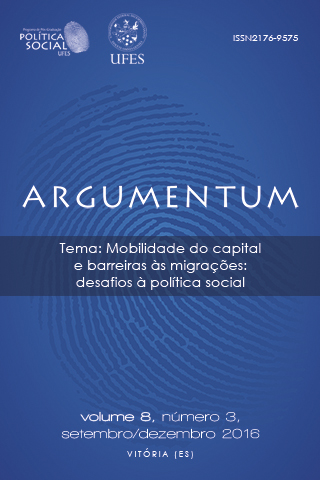Hacking político: crime cibernético ou manifestação legal de protesto?
DOI:
https://doi.org/10.18315/argumentum.v8i3.13396Abstract
O presente trabalho discute as controvérsias em torno de protestos online transgressivos (DDoS, Deface e Leak) a partir da atuação da rede hacktivista Anonymous. Diferentemente de outras formas de manifestações no ambiente virtual, esse tipo de intervenção – coordenada por indivíduos com expertise computacional – encontra-se na fronteira entre o que é ou não politicamente permissível e lícito. Frente a isso, são confrontadas as principais interpretações que permeiam esse debate, concedendo-se especial atenção à abordagem do tema pela legislação brasileira, que tipifica esses atos como delitos informáticos. Essa perspectiva contrasta com a compreensão de que esses atos são socialmente justificáveis como manifestações legais de protesto, a depender de seus propósitos. Este trabalho espera contribuir para os futuros debates acerca das novas táticas de ação na esfera pública interconectada e para o aperfeiçoamento da legislação brasileira sobre o tema.
Downloads
Downloads
Published
How to Cite
Issue
Section
License
Copyright Transfer Agreement
As a condition for submission, the authors must agree with the Copyright Transfer Agreement, by checking the box after reading the clauses.
The author(s) (hereinafter "AUTHOR") hereby agrees to transfer, without any financial compensation, the property of copyrights regarding Argumentum, a journal of the Postgraduate Program in Social Politics (Programa de Pós-graduação em Política Social), Federal University of Espírito Santo (Universidade Federal do Espírito Santo) - Av. Fernando Ferrari, 514 - Goiabeiras 29075-910, Vitória (Brazil), (hereinafter "ARGUMENTUM"), according to the following terms and conditions:
1. I am aware of the terms of "Care Ethics Research Guide" described in the Policies section.
2. AUTHOR warrants to be the writer and copyright holder of the WORK submitted.
3. AUTHOR declares that the WORK does not infringe the rights of third-parties; that the distribution of images (if existent) was authorized; and that AUTHOR assumes total moral and property responsibility for their content.
4. AUTHOR agrees to transfer all the copyrights concerning the WORK to ARGUMENTUM, especially the rights to edit, publish, translate into another language, and reproduce it through any process or technique. ARGUMENTUM becomes the exclusive owner of the rights regarding the WORK, and any total or partial reproduction, in any other medium, printed or electronic, is strictly forbidden without prior written consent by ARGUMENTUM.
5. The copyright transfer is unpaid and, therefore, there will be no monetary compensation whatsoever by ARGUMENTUM in order to use the TEXT.

